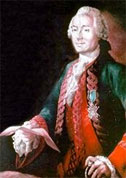

Bernardo de Galvez was born in 1746 in Malaga, Spain, to a noble and
distinguished family in the royal service of the Spanish monarchy.
He arrived in Mexico (New Spain) in 1765, and in 1769, he was made
commandant of Nueva Vizcaya. It was his duty to subdue the Apache
Indians in the area that included Texas. He became governor of
Louisiana in 1777. Galvez's duties required him to maintain and develop
colonial New Spanish Louisiana, but most importantly, to weaken British
influence in the area that included Texas.
 He
became governor of Louisiana in 1777. Galvez's duties required him to
maintain and develop colonial New Spanish Louisiana, but most
importantly to weaken British influence in the area. He had great
admiration for the American Independence movement and was given secret
orders to assist wherever possible. Galvez declared the port of New
Orleans open and free to American forces and began to provide munitions
and cooperated with practically every venture of the rebels in the
area.
He
became governor of Louisiana in 1777. Galvez's duties required him to
maintain and develop colonial New Spanish Louisiana, but most
importantly to weaken British influence in the area. He had great
admiration for the American Independence movement and was given secret
orders to assist wherever possible. Galvez declared the port of New
Orleans open and free to American forces and began to provide munitions
and cooperated with practically every venture of the rebels in the
area.
In 1779, Spain declared war on Great Britain and became an open ally of
the American Revolutionary movement. Forces under General de Galvez
secured the Mississippi River with victories at Manchac, Baton Rouge,
and Natchez, causing great worry in the British high command. In 1780,
now Brigadier-General de Galvez captured Mobile, and was promoted to
Field Marshal and became commander of all Spanish forces in the
Americas.
Galvez captured Pensacola, the British capital of West Florida. After
the revolution, Galvez became viceroy of New Spain in Mexico City,
where he died in 1786 at age forty.
Bernardo de Galvez deserves recognition for his part in helping the
United States gain independence from England and should be remembered
as a patriot. He was, in fact, commended by the Continental Congress
and received letters from Patrick Henry and Thomas Jefferson thanking
him for his service to the United States.
Galveston, Texas and Galveston Bay are named for him and Texans are
proud of his contribution to the American Revolution.